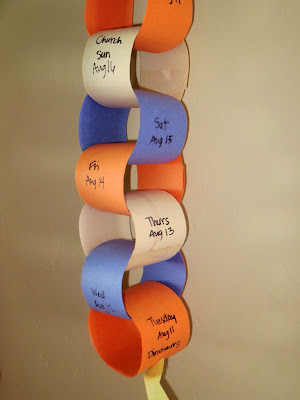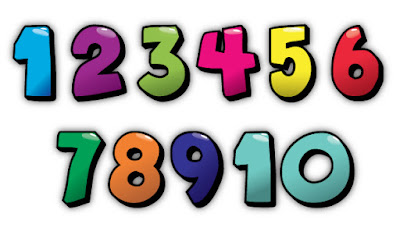Me: "It's not lunch time, it's breakfast."
Kadie: "Mom, last year I went to Aunt Dani's house."
Me: "Sweetheart, we were there yesterday."
Kadie: "Mom, what's today?"
Me: "It's (insert day of the week)."
Kadie: "Does that mean it's splash pad day?"
If you've ever tried to help a young child
understand how many days it is until a certain event or activity, you've
probably been met with confusion and frustration that it's not
happening right now. This is because small children live in the
present and they have a hard time thinking abstractly. Time is a very
abstract and intangible concept, which is why it is difficult to grasp
until they get closer to age 6 or 7 and their brain starts to develop in
a way that they are able to begin to understand things such as time.
My daughter, like many children her age, ask a lot of questions. Some are pretty easy to answer--"Can I have a cookie?" and others...not so much--"Where do babies come from?"
While these seemingly non-stop questions can be frustrating, especially
when the same one has been asked 10 times in the last half hour, it's
helpful to realize that they are asking because they are trying to
understand their world better. As parents, it's our job to help them.
But how can we help them understand something they can't see?
As
my daughter has gotten older, she asks questions about time without
really understanding time itself. She knows that things happen in a
certain order, but doesn't have the cognitive development to fully grasp
how it all works together. In my desire to help her understand her
world better, I've tried a few techniques that have been helpful:
Make a countdown chain This last fall, my daughter started preschool (aaahh!). She was really excited about it and asked me regularly if today is "preschool day". Finally, I decided to help her make a "Countdown to Preschool" chain so she could have a visual representation of the amount of time, or days, left until she starts. I let her choose the colors for the chain, cut out and decorate the top of the chain, and then she helped me tape it together. We put it up on the wall in the kitchen where she can see it every day. I explained to her that each day she could tear off one of the chains and when she tore off the last one, it would be the first day of preschool. We also included other activities that are happening between now and preschool so that she has other events to look forward to along the way.
Help them learn their numbers We've been working with our daughter on numbers for the last year or so. She is at the point where she can count up to 20 easily. She also recognizes numbers if she sees them written down or on a clock. She used to ask me all the time, "Mom, can I have a snack?" Rather than keep telling her that it wasn't time for a snack--an answer she doesn't understand--I showed her the clock and said, "When the short arm reaches the 10, then you know it's snack time." The next time she asked, I pointed at the clock and asked her if the short arm was at 10. If it was, then she knew it was snack time. We've done the same thing with lunch time. This has helped her learn that time moves forward and that certain things happen at certain times. Having a clock to look at makes it more tangible.
Have a routine/schedule One of the very best things you can do for your child is to have a regular, predictable routine or schedule. This applies to many areas, including teaching your children about time. While this doesn't deal directly with numbers or calendars, it does help them know what to expect. A child that can count on something happening is going to transition easier, better and faster than a child that doesn't know what to expect each day. For my daughter, it is helpful if I give a basic outline of what is happening that day. (I usually break it down into morning, afternoon and evening.) If she knows we are going to the grocery store after breakfast, then it's not surprising to her when I tell her she needs to get her shoes on so we can go. If she knows we are going to the park when she wakes up from her nap, she is more likely to go to sleep so that it comes faster. Schedules and routines work wonders with kids and their ability to adjust more quickly and easily.
Is there something that you do that helps your preschooler understand time? I'd love to hear it!
Make a countdown chain This last fall, my daughter started preschool (aaahh!). She was really excited about it and asked me regularly if today is "preschool day". Finally, I decided to help her make a "Countdown to Preschool" chain so she could have a visual representation of the amount of time, or days, left until she starts. I let her choose the colors for the chain, cut out and decorate the top of the chain, and then she helped me tape it together. We put it up on the wall in the kitchen where she can see it every day. I explained to her that each day she could tear off one of the chains and when she tore off the last one, it would be the first day of preschool. We also included other activities that are happening between now and preschool so that she has other events to look forward to along the way.
Teach them a song When my daughter was really little, we watched a lot of
Sesame Street. Some of the first words she learned beyond "mama" and
"dada" were from the songs we watched and listened to. In addition to
watching the videos, we sang during diaper changes, in the car, during
baths, etc. So when she got a little older, around 2.5, we taught her a
little song for the days of the week. It's nothing special, but after
singing it over and over with her, she knows the song without help.
While she doesn't fully understand what the days of the week are, she
understands enough to recognize that each day has a name and goes in
order.
Use a calendar
We have a calendar up in our kitchen that helps me with my meal
planning. Just like any calendar, it has the days of the week at the
top. It's been helpful at times to take the calendar down and show her
what the current day is and what day a certain event is happening. For
example, we went camping a few weeks ago. She kept asking if today was
camping day. We got the calendar down and showed her that, no, today is
Wednesday and we're camping on Friday. And then we'd count how many
days until camping. We repeated this the next day, and the next, until
it was the day we were going camping. She didn't ask as often when we
were going because she would look at the calendar and remember what we
had talked about. I could also remind her of our earlier conversation
so she could think back and answer her own question.
*Another method we could have used was to cross each day off as it happened, which is a variation on the countdown chain. Help them learn their numbers We've been working with our daughter on numbers for the last year or so. She is at the point where she can count up to 20 easily. She also recognizes numbers if she sees them written down or on a clock. She used to ask me all the time, "Mom, can I have a snack?" Rather than keep telling her that it wasn't time for a snack--an answer she doesn't understand--I showed her the clock and said, "When the short arm reaches the 10, then you know it's snack time." The next time she asked, I pointed at the clock and asked her if the short arm was at 10. If it was, then she knew it was snack time. We've done the same thing with lunch time. This has helped her learn that time moves forward and that certain things happen at certain times. Having a clock to look at makes it more tangible.
Have a routine/schedule One of the very best things you can do for your child is to have a regular, predictable routine or schedule. This applies to many areas, including teaching your children about time. While this doesn't deal directly with numbers or calendars, it does help them know what to expect. A child that can count on something happening is going to transition easier, better and faster than a child that doesn't know what to expect each day. For my daughter, it is helpful if I give a basic outline of what is happening that day. (I usually break it down into morning, afternoon and evening.) If she knows we are going to the grocery store after breakfast, then it's not surprising to her when I tell her she needs to get her shoes on so we can go. If she knows we are going to the park when she wakes up from her nap, she is more likely to go to sleep so that it comes faster. Schedules and routines work wonders with kids and their ability to adjust more quickly and easily.
*If
you don't have a regular schedule in place for your kids, try doing it a
little at a time by implementing a morning or bedtime routine. It may
take a little time, but probably less than you expect if you stick with
it.
I
hope that some of these suggestions have been helpful. Every kid is
different and so some of these may work better than others depending on
your child's age and how they process information.






















No comments